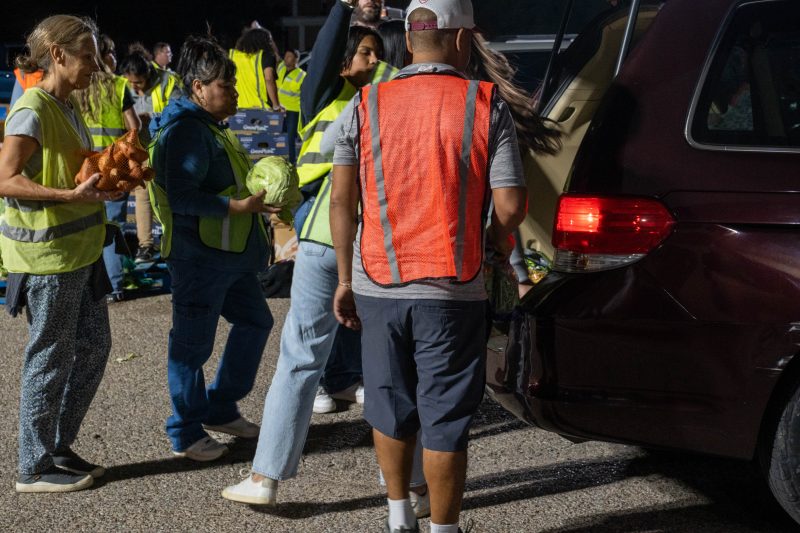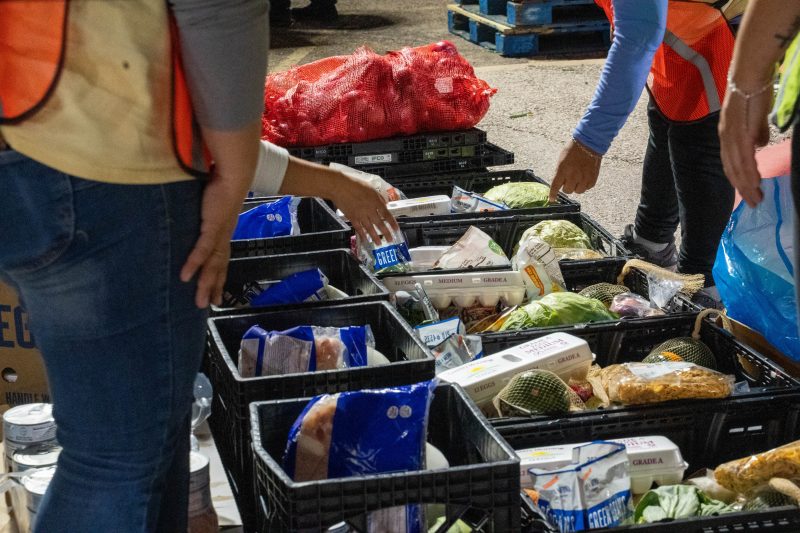For Students and Others Relying on Food Aid, Government Shutdown Hits Home
By Destiny Lewis
Photography By Destiny Lewis
Reporting Texas

Volunteers load food into cars at the Central Texas Food Bank’s special distribution event Tuesday at Austin’s Nelson Field, a response to people needing help as SNAP benefits are paused. Destiny Lewis/Reporting Texas
Nursing student Ariana Walls is already doing the math, adding up her tuition, gas, rent and groceries. With SNAP benefits frozen during the federal government shutdown, she knows something has to give.
“I’m not going to eat,” said Walls, a 20-year-old attending Dallas Community College. “I’m going to have to work an extra day just to have money for groceries and bills.”
More than 3.4 million Texas residents, including over 1.3 million children, rely on the Supplemental Nutrition Assistance Program, according to federal data. In Travis County, the loss of SNAP benefits will affect approximately 44,895 households, which represent over 87,000 people, according to the city of Austin.
Food banks and local governments, including a new initiative in Austin, are stepping in as hunger grows and government support stalls.
Congress failed to pass a federal funding bill by an Oct. 27 deadline in an atmosphere of partisan blame. In a statement on its website, the U.S. Department of Agriculture, which runs SNAP, said “the well has run dry” and claimed that Senate Democrats “have now voted 13 times to not fund the food stamp program.” Democrats rejected that characterization and argued Republicans blocked the funding bill.
This standoff comes after earlier food-aid reductions. The Congressional Budget Office estimates the One Big Beautiful Bill Act signed under President Donald Trump cut nearly $187 billion in SNAP funding through 2034.
Last week, two federal judges ordered the Trump administration to restore funding for SNAP during the federal government shutdown. On Monday, the Trump administration said in a court filing that it would begin issuing partial payments, covering “50% of eligible households’ current allotments.”
But the announcement left major questions unresolved including how soon benefits will be distributed and how millions of families will manage with only half of their usual support.
And even with the court’s order, uncertainty continued. Trump publicly threatened Tuesday to halt all food-stamp payments for the program’s 42 million recipients until the shutdown ends. Hours later, White House press secretary Karoline Leavitt said the administration was “fully complying” with the ruling, adding yet another layer of confusion for families and agencies waiting for guidance.
With SNAP reduced low-income workers, parents, and college students are turning to food banks and campus pantries.
Noelle Newton, vice president of marketing with the Central Texas Food Bank, told Reporting Texas that partner agencies across its service area reported a 35% increase in demand during the monthlong shutdown even before November benefits stopped.
“There are approximately 127,000 households throughout our 21 counties that receive SNAP benefits,” Newton said. “At an average of $350 per month per household, that’s about $44.5 million gone from the wallets of families to purchase their own food. SNAP is meant to be supplemental.
“We are the supplement to the supplement,” she said.
To meet rising needs, the food bank has expanded its services and purchased extra food.
“We are adding food to distributions in high-need ZIP codes and adding night and Saturday distributions focused on SNAP enrollment,” Newton said. “We have purchased nearly $1 million worth of food, including chicken, eggs, milk, tuna, beans, pasta, fruits and vegetables.”
Walls, who has relied on SNAP for two years, said losing benefits could jeopardize her ability to stay in school.
“It helps me tremendously because I don’t have to come out of pocket for groceries,” she said. “Now, I may fall short on bills.”
College students can qualify for SNAP if they work at least 20 hours a week, receive work-study or meet other criteria, but many still struggle to cover basic necessities when benefits are disrupted.
With federal aid frozen, Austin leaders are moving to respond. Mayor Kirk Watson and Travis County Judge Andy Brown joined the Central Texas Food Bank and United Way for Greater Austin on Friday to announce emergency support by holding special food distributions and even offering bill-pay assistance, as SNAP funding runs out.
“These losses hurt children, families, and communities,” Watson said, noting that nearly 13,000 federal workers in Austin have already missed at least one paycheck.
The City of Austin is offering flexible utility payment plans, a 30-day pause on collections and reconnection assistance for households unable to pay bills during the shutdown. The city’s Customer Assistance Program will continue providing relief for vulnerable residents.
As part of the initiative, the Central Texas Food Bank hosted a special distribution event Tuesday at Nelson Field, offering groceries and assistance with SNAP applications.
“We will do everything we can to ensure children don’t go to bed hungry and older adults don’t have to choose between food and medication,” said food bank CEO Sari Vatske.
United Way is also expanding access to food, utility assistance, child-care support, and emergency financial resources with no eligibility screening required.
Ingrid Taylor, the CEO of United Way, said,“Together we can make sure that no one faces hardship alone.”

The Central Texas Food Bank has vowed to step up efforts to feed people suffering while SNAP benefits are unavailable from the federal government. Destiny Lewis/Reporting Texas